Setting Out Structure
Tip's For The Beginner

Written
By: Rick McFerrin
Owner/Full Time Guide
www.tennesseebassguides.com

How many times have you been on the lake and just by chance found
an old sunken tree that someone planted that you couldn't see? Chances
are depending on the season, and if you didn't get hung up in it,
you may very well have caught any number of species of fish out of
it. Of course the Key Word are "If You Didn't Get Hung Up In
It". Right? Planting structure has long since been a key way
for Bass, Crappie, Shell Cracker and Blue Gill fishermen to increase
their catch potential. In past years the structure of choice many
times was a discarded Christmas tree, which definitely will attract
fish. But they are hard to transport in your boat and because of
their buoyancy and depending on the size of the tree took a lot of
weight to secure them to the bottom of the lake. Then, someone thought
of using PVC pipe which was a great idea. The PVC helped eliminate
having your bait hung up but to get the attractor to resemble a "Tree" or
a "Bush it took several different size of pipe and multiple
elbows and t's. And depending on the size a bigger chunk of something
to hold it down. Then a gentleman (and Crappie fanatic) named Larry
Harper helped improved on the PVC idea to create what I believe to
be the best attractor on the market today. The Porcupine Fish Attractor.
Let me explain how the Porcupine works and what it is.
The Porcupine Fish Attractor
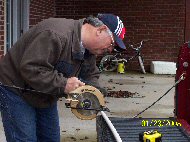
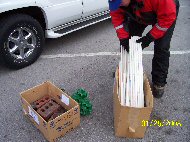 The center of the attractor is a round globe looking sphere that
has 26 holes drill into it that accommodates 1/2 inch thin wall PVC
pipe cut to the length of your choice. The PVC pipe plugs into the
sphere and sticks out in all directions. The pipe is secured to the
sphere by using a good PVC glue that can be purchased at any good
hard are store. That's me with a saw in my hands instead of an All
Pro APX Rod. I think the rod fits my hands better. If you look closely
at the picture to the right you can see the green sphere, cut PVC
pipe and the bricks that we used this time as anchors. The only thing
you can't see is the 1/2 inch T's that you place on the bottom of
the center pipe that will hold your bricks. (See picture below) The
first thing I did and I would recommend you think about doing the
same, is building one of these in your back yard first to get a good
idea of what you will be faced with when you get to the lake. I decided
to cut my pipe in 3 foot lengths which made the entire attractor
almost 5 feet tall when completed. You can get a good idea of it's
The center of the attractor is a round globe looking sphere that
has 26 holes drill into it that accommodates 1/2 inch thin wall PVC
pipe cut to the length of your choice. The PVC pipe plugs into the
sphere and sticks out in all directions. The pipe is secured to the
sphere by using a good PVC glue that can be purchased at any good
hard are store. That's me with a saw in my hands instead of an All
Pro APX Rod. I think the rod fits my hands better. If you look closely
at the picture to the right you can see the green sphere, cut PVC
pipe and the bricks that we used this time as anchors. The only thing
you can't see is the 1/2 inch T's that you place on the bottom of
the center pipe that will hold your bricks. (See picture below) The
first thing I did and I would recommend you think about doing the
same, is building one of these in your back yard first to get a good
idea of what you will be faced with when you get to the lake. I decided
to cut my pipe in 3 foot lengths which made the entire attractor
almost 5 feet tall when completed. You can get a good idea of it's
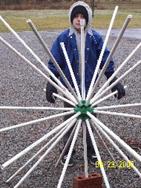
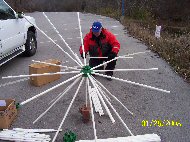 size by looking at the picture to the immediate left with my youngest
son Daniel. Daniel is right at 5 feet tall even without the heavy
coat, toboggan and hood. By the way it was 26 degrees when I did
this project at home and he kept saying. Daddy can't we put this
together in the barn? Having every thing pre-cut and organized it
was very easy for Ken and I to assemble these in the parking lot
at the lake. Now you can begin to see why the Porcupine Fish Attractor
has so many advantages over a real tree or a conventional PVC pipe
attractor. The spine that stick out gives these a much fuller "PVC
TREE" for the fish to swim in and out of, but yet still retains
the benefit of being snag free with your artificial and live bait.
The PVC pipe provides cover and will collect algae which will attract
bait fish which will attract the ones your looking for. Since the
PVC is hollow on the inside water will fill the tubes quickly as
it sinks and unless you place these where there is a lot of current
2 bricks should be plenty to hold them securely.
size by looking at the picture to the immediate left with my youngest
son Daniel. Daniel is right at 5 feet tall even without the heavy
coat, toboggan and hood. By the way it was 26 degrees when I did
this project at home and he kept saying. Daddy can't we put this
together in the barn? Having every thing pre-cut and organized it
was very easy for Ken and I to assemble these in the parking lot
at the lake. Now you can begin to see why the Porcupine Fish Attractor
has so many advantages over a real tree or a conventional PVC pipe
attractor. The spine that stick out gives these a much fuller "PVC
TREE" for the fish to swim in and out of, but yet still retains
the benefit of being snag free with your artificial and live bait.
The PVC pipe provides cover and will collect algae which will attract
bait fish which will attract the ones your looking for. Since the
PVC is hollow on the inside water will fill the tubes quickly as
it sinks and unless you place these where there is a lot of current
2 bricks should be plenty to hold them securely.
Where Do You Place The Attractor?
Truthfully you could place the Porcupine just about any where. And
depending on the length you cut your pipe in all depths of water.
My dilemma was that on the lake I guide, the water fluctuates in
depth as much as 15 feet or more due to the 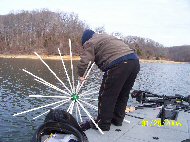
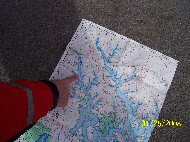 winter draw down and
can vary from year to year. So it was very important to make my decision
on placement before I ever got to the lake. With the help of long
time good friend Mr. Ken Jenkins we did a little map planning well
in advance. Be sure that the map that you use has GPS coordinates
on it so when you get to the lake you can enter them into your GPS
when you drop the sphere and mark your map as well. It was important
to me to get these within my fishing comfort depth range and still
have them hidden out of sight until the water comes up. Why? Well
if I don't they will just become another community hole. And since
I guide full time I'm kind of stingy like that. The Porcupine Fish
Attractors will work in ponds, around boat docks, either sunken or
suspended with a cable or rope. Spawning areas, flats, ledges and
drops. You can create a "stump row" leading from deep water
to shallow water. The possibilities are endless, especially if your
lake stays at a fairly constant water level.
winter draw down and
can vary from year to year. So it was very important to make my decision
on placement before I ever got to the lake. With the help of long
time good friend Mr. Ken Jenkins we did a little map planning well
in advance. Be sure that the map that you use has GPS coordinates
on it so when you get to the lake you can enter them into your GPS
when you drop the sphere and mark your map as well. It was important
to me to get these within my fishing comfort depth range and still
have them hidden out of sight until the water comes up. Why? Well
if I don't they will just become another community hole. And since
I guide full time I'm kind of stingy like that. The Porcupine Fish
Attractors will work in ponds, around boat docks, either sunken or
suspended with a cable or rope. Spawning areas, flats, ledges and
drops. You can create a "stump row" leading from deep water
to shallow water. The possibilities are endless, especially if your
lake stays at a fairly constant water level.
Conclusion
Larry has sure helped to come up with a great idea that I know will
increase my customers catch over the next year. And the Porcupine
Fish Attractor can do the same for you. They are durable, easy to
assemble, provides habitat for spawning areas on older lakes that
have lost some of it's original structure, gives the fisherman some
private structure of their own. And can make the difference between
a so so day and a good one on the lake. It is a good idea to check
with your state fishery department to find out if any laws pertain
to dropping structure before you start out. For more information
on the Porcupine Fish Attractor you can click on the logo and go
directly to their web site, call 270-254-0150 or e-mail Larry Harper
at lharper@fishattractor.net. It's going to fun to see what comes
off my Porcupines this season. Watch the Home page of my site for
follow up reports and pictures.
God Bless,
Rick McFerrin
Owner/Full Time Guide
Tennessee Bass Guides LLC
www.tennesseebassguides.com
More Tips Tennesse
Guide Service

